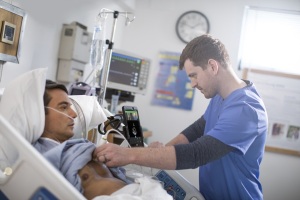UltraSight AI enables novice sonographers to capture high-quality heart images
by
Gus Iversen, Editor in Chief | November 29, 2022

The UltraSight AI study was conducted using Philips Lumify ultrasound systems
Israeli-based tech company UltraSight shared unpublished findings that illustrates the ability of its AI to enable medical professionals with no prior sonography experience to conduct diagnostic echocardiographic exams.
The multicenter study was conducted across two U.S. locations, including the University of Chicago and Aurora St. Luke's Medical Center in Milwaukee, Wisconsin, and at the Sheba Medical Center in Israel. It evaluated 2D transthoracic echocardiography images acquired by nine residents and registered nurses, none of whom had prior cardiac ultrasound experience, using UltraSight's AI real-time guidance software on Philips Lumify ultrasound devices.
The underlying AI neural network predicts the position of the ultrasound probe relative to the heart, based on the ultrasound video stream, and guides the user on how to maneuver the probe to acquire images of diagnostic quality. The study was conducted using the Philips Lumify ultrasound device.
After undergoing a one-day training course, the novice ultrasound users scanned 240 cardiac patients and acquired 10 standard echocardiography views. The patients were also scanned by a professional sonographer, without using the software, and each exam was blindly evaluated by a panel of five USA board-certified cardiologists who graded the exams for their diagnostic quality and anatomical elements.
"The quality of the exams conducted by both the novice users and professional cardiac sonographers were remarkably comparable," said Dr. Roberto M. Lang, director of the noninvasive cardiac imaging laboratory at the University of Chicago, and the principal investigator. "After analyzing the results, it is apparent that healthcare professionals without prior sonography training can follow the guidance offered by the software and capture diagnostic-quality ultrasound images of patients' hearts."
The cardiac exams performed by the novice ultrasound users successfully permitted the assessment of the following:
Left ventricular size (99.2%)
Left ventricular function (99.6%)
Right ventricular size (93%)
Presence of significant pericardial effusion (100%)
The results also showed that using UltraSight's AI guidance, novice ultrasound users may acquire diagnostic-quality images of the 10 standard echocardiographic views in 68 – 94% of exams, similar to the results from a pilot study conducted earlier this year.
"The next step is to expand our offering to be available on additional ultrasound devices. UltraSight sees great value in being device agnostic and supporting existing devices available in the market today — reducing the entry barrier and eliminating the need to force hardware replacement," UltraSight CEO Davidi Vortman told HCB News. "While the first clinical trials have been done with a software version compatible with Philips, there is no exclusivity and we are working with leading ultrasound vendors, such as GE Healthcare and others, to expand compatibility across numerous point-of-care devices."
UltraSight obtained a CE Mark for its AI guidance software for cardiac ultrasound, and it is now available in the European Union to institutions interested in using it for clinical trials. The UltraSight software is currently under FDA review and is pending a 510K clearance.
|
|
|
You Must Be Logged In To Post A Comment
|
